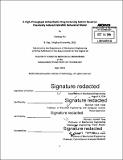A high-throughput antiepileptic drug screening system based on chemically Induced zebrafish behavioral model
Author(s)
Wu, Yuelong, Ph. D. Massachusetts Institute of Technology
DownloadFull printable version (8.143Mb)
Other Contributors
Massachusetts Institute of Technology. Department of Mechanical Engineering.
Advisor
Mehmet Fatih Yanik.
Terms of use
Metadata
Show full item recordAbstract
Epilepsy, which has the largest worldwide impacts among all nervous system diseases expect for stroke and dementia, is a group of long-term neurological disorders characterized by epileptic seizures. AED medications are the mainstay for epileptic seizure management. However, the existing AEDs cannot fit the needs for every patient due to the efficacy and side effect issues. In this thesis, a high-throughput system to screen new antiepileptic drug is built up. Chemically induced zebrafish larvae are used as a seizure model. The change in fishes' behavior patterns serves as an indicator of the fishes' nervous system condition. The design of the behavior data acquisition setup as well as the requirements of its components is described. A fish tracking program that tracks the locomotion variables like the head position, the tail movement and sideway orientation etc. is developed. The tracking results are treated either by simply computing the statistics of the tracking variables or implementing behavior pattern classifications. Two test datasets involving two different convulsants and one known AED are acquired and analyzed. The results coincide with the existing knowledge about the chemicals' effects on the human nerve system, which suggests the system described in this thesis is promising to help with the actual AED development.
Description
Thesis: S.M., Massachusetts Institute of Technology, Department of Mechanical Engineering, 2014. Cataloged from PDF version of thesis. Includes bibliographical references (pages 53-59).
Date issued
2014Department
Massachusetts Institute of Technology. Department of Mechanical EngineeringPublisher
Massachusetts Institute of Technology
Keywords
Mechanical Engineering.